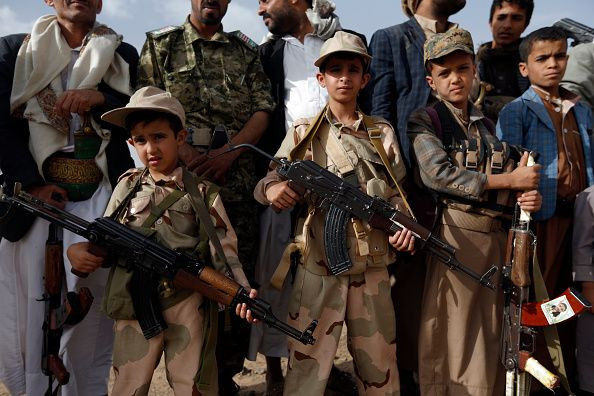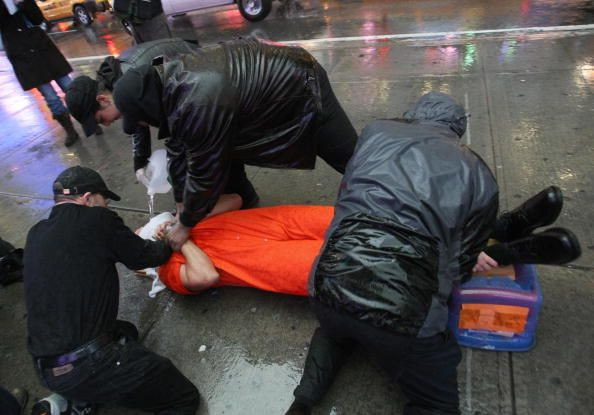Secret Yemen Prisons Of UAE Sexually Assaulted And Tortured Inmates With Fire, Captives Say

A network of secret prisons in southern Yemen run by the United Arab Emirates or Yemeni forces was used to detain and torture people allegedly associated with terrorist groups, reported the Associated Press Thursday. One method used to torture detainees was referred to as the “grill,” which described an individual being tied to a spit and spun around a circle of fire. Former inmates also described being sexually assaulted.
“We could hear the screams,” a former inmate held for six months told the AP. “The entire place is gripped by fear. Almost everyone is sick, the rest are near death. Anyone who complains heads directly to the torture chamber.”
According to the Human Rights Watch, 49 people have been detained in the Aden and Hadramawt areas of Yemen. Among those detained, four were children. Yemeni forces and UAE forces abducted these people to interrogate them about associations with terror organizations such as ISIS and al-Qaida. At least 18 locations have been recorded by compiling testimonies from former detainees as well as from military officials. They have been kept a secret from Yemen’s government.
Since 2015, a military coalition led by Saudi forces has supported Yemen in its civil war against rebels. The United States has supported this coalition.
United States defense officials said American forces interrogated detainees in Yemen, but they did not participate in any torture. No abuse occurred when U.S. forces were present, according to senior military officials.
Read: Qatar Crisis Explained: What You Need To Know About Tensions In The Gulf
“We always adhere to the highest standards of personal and professional conduct,” said Chief Defense Department spokeswoman Dana White to AP. “We would not turn a blind eye, because we are obligated to report any violations of human rights.”
The UAE has denied the accusations of secret prisons used for interrogations and torture.
“You don’t effectively fight extremist groups like al-Qaida or ISIS by disappearing dozens of young men and constantly adding to the number of families with ‘missing’ loved ones in Yemen,” said Sarah Leah Whitson, Middle East director at Human Rights Watch. “The UAE and its partners should place protecting detainee rights at the center of their security campaign if they care about Yemen’s long-term stability.”
Former detainees at these secret prisons were interviewed about their time there. They described being beaten, sexually assaulted and subjected to a torture device called the “grill,” among other occurrences. When detainees are placed on the “grill,” they are tied to a spit and spun around a circle of fire.
One former prisoner, who was never questioned by United States military personnel, but who was beaten by Yemeni officials, spoke about his time there.
“I would die and go to hell rather than go back to this prison,” he said. “They wouldn’t treat animals this way. If it was bin Laden, they wouldn’t do this.”

Although the United States denied its involvement in the direct torture of those held in these secret Yemeni prisons, in the past, U.S. officials have been accused of torture abroad.
In a series of memos released by Barack Obama in 2009, the world learned that the CIA under the Bush administration was allowed to torture suspects held in secret facilities around the world. Among the approved torture techniques listed were cramped confinement, facial slaps and waterboarding. Waterboarding, one of the most notorious forms of torture, occurs when a person is tied to a bench with their feet elevated and is then blindfolded. Upon being blindfolded, the torturers cover the cloth with water to create the sensation of drowning.
Since then, waterboarding has been ruled as torture.
Ryan Goodman, a law professor at New York University, drew a parallel between the allegations of torture by the UAE in Yemen, saying, “The UAE was one of the countries involved in the CIA's torture and rendition program. These reports are hauntingly familiar and potentially devastating in their legal and policy implications.”
In Yemen, U.S. forces send questions to forces holding the detainees, who then send videos with their answers, said Yemeni Brigadier General Farag Salem al-Bahsani, commander of the 2nd Military District. According to him, the United States provides a list of the most wanted suspects to help UAE and Yemeni forces during arrests. U.S. officials have confirmed these reports.
© Copyright IBTimes 2024. All rights reserved.





















